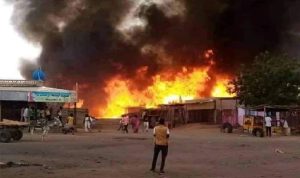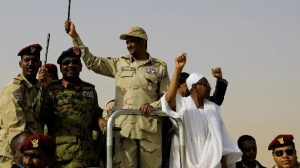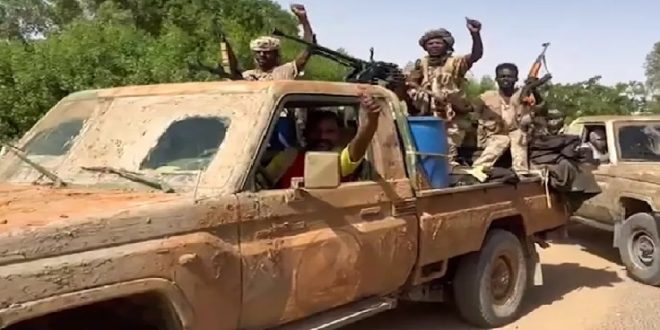06-12-2024
KHARTOUM: Sara Ismail wears a black hijab and camouflage, and wields an AK-47, in the central market of el-Fasher, the capital of North Darfur.
The 30-year-old is a member of the Sudan Liberation Army belonging to Minnie Arko Minnawi (SLA-MM), a former Darfur rebel leader now allied with the Sudanese army.
 “We’ve picked up weapons to protect our land and ourselves,” she said, holding her rifle close.
“We’ve picked up weapons to protect our land and ourselves,” she said, holding her rifle close.
Formerly part of the political office of the SLA-MM, Ismael decided to take up arms seven months ago to protect her community and herself from the Rapid Support Forces (RSF), a paramilitary fighting the army for control of Sudan since April 2023.
Hailing from the Zaghawa, a Darfuri tribe classified as “non-Arab”, she is on duty in el-Fasher while her family lives in the nearby displacement camp, Zamzam.
She worries for their safety with the looming threat of the RSF, who for decades have been known for their brutal violence against non-Arabs in Darfur, including wielding sexual violence as a weapon of war.
“I swear to God, I won’t get raped (by the RSF). I would rather die than get raped by them,” Ismael said vehemently.
From past to present
The possibility of the RSF ruling el-Fasher terrifies inhabitants, especially those who lived through the first Darfur war which erupted in 2003 and sputtered on since.
Darfur’s tribal society is classified broadly into “non-Arab” (sedentary) and “Arab” (nomadic) tribes, both groupings are Black and Muslim and have lived in Darfur for centuries. The non-Arab tribes speak several languages, as well as Arabic.
In 2003, former President Omar al-Bashir, a military man who came to power through a coup in 1989 outsourced to Arab tribal militias the task of crushing an uprising by mostly non-Arab uprising groups angered by the region’s longstanding political and economic marginalization.
 His tribal militias became notoriously known to its victims and observers as the Janjaweed (Devils on Horseback) for committing harrowing abuses, including burning entire villages to the ground and carrying out summary killings, leading to accusations of ethnic cleansing and genocide.
His tribal militias became notoriously known to its victims and observers as the Janjaweed (Devils on Horseback) for committing harrowing abuses, including burning entire villages to the ground and carrying out summary killings, leading to accusations of ethnic cleansing and genocide.
Years later, these Arab tribal militias were repackaged by al-Bashir as the RSF but many Sudanese, like Ismael, still call the RSF “Janjaweed”.
“Many of us have had to carry weapons since 2004,” she said. “Since 2004, the Janjaweed has been raping us and killing women and girls.”
By November 2023, the RSF had conquered four Darfur states South, East, West and Central and looked like it would soon take the North, sowing fear among the people and armed groups living there.
In April, possibly angered by the el-Fasher armed movements abandoning neutrality and declaring allegiance to the army, the RSF encircled el-Fasher and nearby towns.
The armed movements saw a surge in recruitment as the standoff cut along ethnic lines, with “non-Arab” tribes preparing to square off against “Arab” tribes.
Despite the el-Fasher armed movements coming together, a source from an international nongovernmental organization monitoring developments in el-Fasher said, the RSF might capture the city at any moment.
“We are closer than we have ever been to that scenario, but how close remains anybody’s guess,” said the source, who requested anonymity to protect staff on the ground.
“I wake up every day and I think this could be the day.”
Both sides in the current conflict have committed human rights abuses in Darfur blocking aid, firing on civilians and executing prisoners, according to rights groups and a report by a UN fact-finding mission. (Int’l News Desk)
 Pressmediaofindia
Pressmediaofindia




